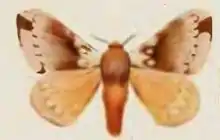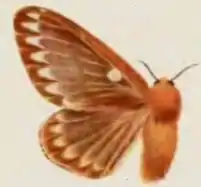Cotana variegata
Cotana variegata is a moth in the family Eupterotidae. It was described by Walter Rothschild in 1917.[1] It is found in New Guinea.[2]
| Cotana variegata | |
|---|---|
 | |
| Male | |
 | |
| Female | |
| Scientific classification | |
| Kingdom: | |
| Phylum: | |
| Class: | |
| Order: | |
| Family: | |
| Genus: | |
| Species: | C. variegata |
| Binomial name | |
| Cotana variegata Rothschild, 1917 | |
The wingspan is about 47 mm for males and 74 mm for females. The basal one-fourth of the forewings of the males is cream white, with an oblique chocolate streak, below which is a looped zigzag line which forms a white stigma just below the streak. There is an antemedian dark-chocolate transverse band and the central one-third of the wing is pale chocolate, becoming paler distad. The outer one-third is creamy grey with a crenulate postdiscal brown line, a dark-chocolate spot before the tornus and a quadrate dark-chocolate patch between vein seven and half-way between veins six and five. The hindwings are orange with a postmedian transverse crenulate dark band beyond which is a similar lunate one. Females have chocolate-rufous-brown forewings with yellow nervures and a round white spot below the cell in the basal one-third of the wing. There is a slightly curved median darker chocolate band and a postdiscal row of eight intranervular wedge-shaped white patches. The hindwing ground colour and median band are similar, but with a postdiscal row of wedge-shaped golden-yellow patches.[3]
References
- Beccaloni, G.; Scoble, M.; Kitching, I.; Simonsen, T.; Robinson, G.; Pitkin, B.; Hine, A.; Lyal, C., eds. (2003). "Cotana variegata". The Global Lepidoptera Names Index. Natural History Museum. Retrieved May 20, 2018.
- Zolotuhin, Vadim (October 22, 2012). "The Giant Lappet Moths (Lepidoptera: Eupterotidae) of Papua Indonesia". Papua-Insects.nl. The Papua Insects Foundation.
- Rothschild, Lord (1917). "On the Genera Melanothrix, Drepanojana, Melanergon, Paracydas, Cotana, Hypercydas, Epicydas, and Nervicompressa of the Family Eupterotidae with Descriptions of New Forms". Novitates Zoologicae. 24: 463–492. doi:10.5962/bhl.part.23154 – via BioStor.